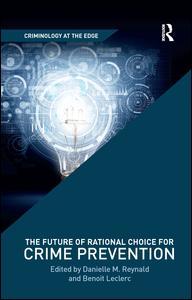The Future of Rational Choice for Crime Prevention Criminology at the Edge Series
Coordonnateurs : Reynald Danielle, Leclerc Benoit

The rational choice perspective (RCP) is currently the core theoretical approach underpinning situational crime prevention (SCP). To date, many crimes have been studied through the lens of RCP, which increased our understanding of these phenomena, how they are committed and how they could potentially be prevented through SCP. This book, designed with the hope of moving RCP forward for SCP purposes, takes a challenging but novel step in providing leading experts from different disciplines with the opportunity to express themselves on how we could best achieve this task.
This book explores various perspectives, which include the development of frameworks based on the role of situations in crime or forensic sciences for improving crime prevention practices. The need to consider affective states and other offender-related factors to improve our understanding of offender decision-making models is highlighted as a means to better predict which SCP mechanisms may be most useful in discouraging particular types of offenders. Finally, it is also argued that the use of RCP should be more pragmatic and that this perspective should be preserved and adapted based on what we find in our experiments.
Taken together, these theoretically distinctive and challenging contributions ultimately guide how crime prevention practices could be best approached in the future.
1. What could be the future of rational choice for crime prevention? Benoit Leclerc and Danielle M. Reynald, 2. Does situational crime prevention require a rational offender? Richard Wortley and Nick Tilley, 3. Hot criminology or what Homer’s Odyssea can teach criminologists about decision-making, Jean-Louis van Gelder, 4. Theorising forensic science: a model for crime prevention, Paul Knepper, 5. A baseline model of deterrence, Matthew Manning, 6. Another look at person-situation interaction: what offenders are sensitive to what situational crime prevention measures? Henk Elffers and Danielle M. Reynald
Danielle M. Reynald is a criminologist at the Griffith Criminology Institute and senior lecturer at the School of Criminology and Criminal Justice at Griffith University, Brisbane, Australia.
Benoit Leclerc is a researcher at the Griffith Criminology Institute and associate professor of criminology and criminal justice at Griffith University, Brisbane, Australia.
Date de parution : 02-2019
13.8x21.6 cm
Date de parution : 09-2017
13.8x21.6 cm
Thèmes de The Future of Rational Choice for Crime Prevention :
Mots-clés :
Subjective Expected Utility Theory; Cognition and Crime; SCP; Offender decision making; SCP Theory; Rational Choice Perspective; Situational Crime Prevention Measures; Rational Offender; Crime Pattern Theory; Situational Crime Prevention; Person Situation Interaction; The Crime Event; RCP; Benoit Leclerc; Danielle M; Reynald; Progressive Problem Shift; Richard Wortley; Crime Events; Nick Tilley; Visceral Factors; Jean-Louis Van Gelder; Hot Mode; Paul Knepper; Forensic Science; Matthew Manning; Cost Benefit Parameters; Henk Elffers; SCP Technique; Offender Characteristics; Cool Perspective; Criminal Decision Making; Capital Punishment; Cool Mode; Cost Perceptions; Offender Types; Crime Prevention; Criminal Choice; Space Time Budget



